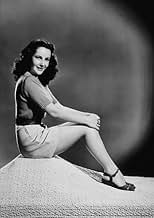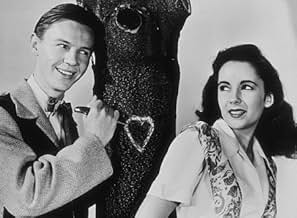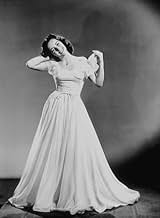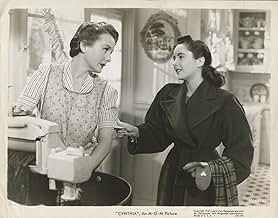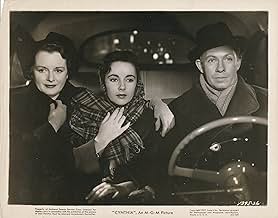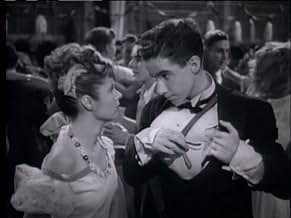Ajouter une intrigue dans votre langueSickly girl finds an outlet in music.Sickly girl finds an outlet in music.Sickly girl finds an outlet in music.
- Réalisation
- Scénario
- Casting principal
- Récompenses
- 1 victoire au total
Carol Brannon
- Fredonia Jannings
- (as Carol Brannan)
Erville Alderson
- Dingle Clerk
- (non crédité)
Charles Bradstreet
- Stubby Stubblefield
- (non crédité)
Avis à la une
ELIZABETH TAYLOR's fans are really the only ones who will find any reason to watch CYNTHIA, a sugar-coated confection about a sickly girl churned out by MGM for the fast developing teen who was turning into a woman almost overnight.
Here, at fifteen, she's still got a lot of her girlish charm, exhibits a modest singing voice (is that her???), and portrays a girl who's so fragile that her parents hold her back from doing anything more strenuous than going to the corner store.
Ironically, it foretells Liz's own lifelong struggle with illness. GEORGE MURPHY and MARY ASTOR are her rather stern but loving parents and JIMMY LYDON is the boyfriend who gives Taylor her first screen kiss. S.Z. SAKALL is her encouraging music teacher.
It's all very downbeat without a sense of humor, too straightforward in the telling for its own good. Unimaginative and more of a B-film than anything else.
Here, at fifteen, she's still got a lot of her girlish charm, exhibits a modest singing voice (is that her???), and portrays a girl who's so fragile that her parents hold her back from doing anything more strenuous than going to the corner store.
Ironically, it foretells Liz's own lifelong struggle with illness. GEORGE MURPHY and MARY ASTOR are her rather stern but loving parents and JIMMY LYDON is the boyfriend who gives Taylor her first screen kiss. S.Z. SAKALL is her encouraging music teacher.
It's all very downbeat without a sense of humor, too straightforward in the telling for its own good. Unimaginative and more of a B-film than anything else.
Elizabeth Taylor seemed to go almost overnight in films from child to voluptuous young woman. But in this nice low-budget (for MGM) movie, made when she was 15 at most, there is something of the sweetly awkward colt about her, in the title role. There are scenes in which she sort of oscillates between childhood and adulthood--the visual equivalent of an adolescent's voice cracking--and it was in this movie that she got her first screen kiss (from an engaging James Lydon).
It's a bittersweet movie, about the deferrals and compromises that one has to make in life--the parents who don't continue their higher education, the soldier who resumes his, the refugee professor. As Cynthia's mother, Mary Astor brings her usual warmth and common sense, and there are vague echoes of her questing, yearning character in "Dodsworth." Cynthia's illness is used as something of a metaphor for domestic discontent, and in view of Taylor's chronic health problems is a little unsettling in retrospect.
It's a bittersweet movie, about the deferrals and compromises that one has to make in life--the parents who don't continue their higher education, the soldier who resumes his, the refugee professor. As Cynthia's mother, Mary Astor brings her usual warmth and common sense, and there are vague echoes of her questing, yearning character in "Dodsworth." Cynthia's illness is used as something of a metaphor for domestic discontent, and in view of Taylor's chronic health problems is a little unsettling in retrospect.
If the one-sentence synopsis, "A sickly teenager wishes more than anything to be allowed to perform in the school play," doesn't grab you, don't pay it any attention. Watch Cynthia anyway. It's a delightful gem from Elizabeth Taylor's younger days, even earlier than Little Women! And speaking of Little Women, Mary Astor plays Liz's mother in this film as well. George Murphy plays her father, and S.Z. Sakall rounds out the cast as the school's lovable theater director.
At the start of the film, Mary and George are shown young and in love, and their adorable romance quickly blossoms into marriage. They have grand plans to live in Vienna and study music and medicine, but when Mary gets pregnant, their plans go on hold temporarily. Fifteen years later, they're stuck in the same small town, renting a house they can't afford, struggling to pay their daughter's outrageous doctor's bills on a one-income salary from George's work in a hardware store. The parents' part of the film is actually quite sad, as you feel their disappointment as well as their guilt whenever they resent their lost dreams. Both George and Mary give wonderful performances.
Because George and Mary are so three-dimensional, it's difficult to call Liz the gem of the film, but she really is. She's so delightful, innocent, charming, passionate, and frail, culminating in such a captivating performance it's absolutely impossible not to love her. And since it's so impossible not to love her, you understand why George bows and scrapes to his boss as well as his brother-in-law, the greedy Gene Lockhart who treats Liz during her countless illnesses. You understand every part of Mary's behavior, as she embodies every mother's journey in raising a teenaged daughter. In one scene, Liz comes home from her first date. Mary wants to revel in her daughter's happiness, but she also tries to instill responsibility, like taking better care of her dress or soaking in a hot bath so she won't catch cold.
Every part of this movie is a joy to watch, from the cute to the tragic. You'll reach for your handkerchief from time to time, and if you watch this with your kids or parents, you'll cry even more. Everyone gives strong performances, and I'm sure you'll find your favorite moments as I have. At the heart of it all is Elizabeth Taylor, so beautiful and yet so innocent and fresh, even though it's impossible she ever felt what her character went through in real life. How could the gorgeous Elizabeth Taylor know what it felt like to be ignored by all the boys in school, and then the thrilling joy at being allowed to go to her first dance? It's called acting, and she does it beautifully.
At the start of the film, Mary and George are shown young and in love, and their adorable romance quickly blossoms into marriage. They have grand plans to live in Vienna and study music and medicine, but when Mary gets pregnant, their plans go on hold temporarily. Fifteen years later, they're stuck in the same small town, renting a house they can't afford, struggling to pay their daughter's outrageous doctor's bills on a one-income salary from George's work in a hardware store. The parents' part of the film is actually quite sad, as you feel their disappointment as well as their guilt whenever they resent their lost dreams. Both George and Mary give wonderful performances.
Because George and Mary are so three-dimensional, it's difficult to call Liz the gem of the film, but she really is. She's so delightful, innocent, charming, passionate, and frail, culminating in such a captivating performance it's absolutely impossible not to love her. And since it's so impossible not to love her, you understand why George bows and scrapes to his boss as well as his brother-in-law, the greedy Gene Lockhart who treats Liz during her countless illnesses. You understand every part of Mary's behavior, as she embodies every mother's journey in raising a teenaged daughter. In one scene, Liz comes home from her first date. Mary wants to revel in her daughter's happiness, but she also tries to instill responsibility, like taking better care of her dress or soaking in a hot bath so she won't catch cold.
Every part of this movie is a joy to watch, from the cute to the tragic. You'll reach for your handkerchief from time to time, and if you watch this with your kids or parents, you'll cry even more. Everyone gives strong performances, and I'm sure you'll find your favorite moments as I have. At the heart of it all is Elizabeth Taylor, so beautiful and yet so innocent and fresh, even though it's impossible she ever felt what her character went through in real life. How could the gorgeous Elizabeth Taylor know what it felt like to be ignored by all the boys in school, and then the thrilling joy at being allowed to go to her first dance? It's called acting, and she does it beautifully.
At the height of her film career Elizabeth Taylor was one of the most famous women in the world, and even after she retired from acting she remained famous, largely because of her notoriously complex love-life. And yet there are a surprisingly large number of films on her CV which today are virtually forgotten and which even when first released probably did not arouse a great deal of interest. "Cynthia", dating from 1947 when Taylor was only fifteen, is a case in point.
Cynthia Bishop is a beautiful teenage high school girl from the small town of Napoleon, Illinois. Most of the plot revolves around the point that Cynthia is supposedly physically frail and suffers from health problems and is therefore not allowed to do many of the things that teenage girls normally do, such as attending the school prom. There is also a sub-plot dealing with the frustrated dreams of her parents Larry and Louise, both of whom once dreamed of going to Vienna, Larry to study medicine and Louise to study music. They never, however, realised these ambitions, and today Larry is a badly-paid assistant in a hardware store and Louise a housewife.
The film was based on a play called "The Rich, Full Life", and although I have never seen it- indeed, I had never previously heard of it or of its author, one Viña Delmar- that title seems to sum up the general theme. The idea is that one can still live a rich, full life even if one is an invalid or if one's youthful ambitions have been thwarted. The screenplay, however, does not fully realise the potential of either of the two plotlines, and too much is left unclear. We are never told exactly why Louise and Larry were unable to study in Vienna; the implication is that Louise accidentally became pregnant out of wedlock and that theirs was a shotgun marriage, but in the moral climate of the forties, with the Production Code still in full force, this could not be made explicit. (There is no acknowledgement of the fact that the Vienna of the 1930s, torn by political strife between Nazis, Communists, Socialists and Austro-fascists, might not have been the most congenial place in which to study, nor of the fact that there are perfectly good medical schools and colleges of music in America itself; the "Vienna" of this film is simply a romantic symbol of youthful illusions, not a real-life city).
Cynthia is the title character, and most of the action revolves around her, but the healthy-looking Taylor never makes a convincing invalid. It is never made clear exactly what illnesses Cynthia suffers from, beyond the fact that she tends to catch cold easily- Taylor spends a lot of the film sneezing- or whether her status as an invalid is genuine. It is strongly hinted that she may in fact be the victim of obsessive concern on the part of her over-protective parents, backed up by the local doctor (who also happens to be Cynthia's uncle)- what one might call hypochondria by proxy.
The film-makers never seem quite clear whether they are making a comedy or a serious family drama. The overall theme is a basically serious one, but in many parts, especially those scenes dealing with the rivalry between Cynthia and her insufferable cousin Fredonia, they are obviously aiming for laughs. (Whether they actually achieve them is another matter). Taylor displays both the beauty and the charisma which were later to make her a big adult star, but not unfortunately the talent, and there are no performances of any particular merit from anyone else in the cast. It is not difficult to understand why "Cynthia" is today one of the most obscure entries in Taylor's filmography. 4/10
Cynthia Bishop is a beautiful teenage high school girl from the small town of Napoleon, Illinois. Most of the plot revolves around the point that Cynthia is supposedly physically frail and suffers from health problems and is therefore not allowed to do many of the things that teenage girls normally do, such as attending the school prom. There is also a sub-plot dealing with the frustrated dreams of her parents Larry and Louise, both of whom once dreamed of going to Vienna, Larry to study medicine and Louise to study music. They never, however, realised these ambitions, and today Larry is a badly-paid assistant in a hardware store and Louise a housewife.
The film was based on a play called "The Rich, Full Life", and although I have never seen it- indeed, I had never previously heard of it or of its author, one Viña Delmar- that title seems to sum up the general theme. The idea is that one can still live a rich, full life even if one is an invalid or if one's youthful ambitions have been thwarted. The screenplay, however, does not fully realise the potential of either of the two plotlines, and too much is left unclear. We are never told exactly why Louise and Larry were unable to study in Vienna; the implication is that Louise accidentally became pregnant out of wedlock and that theirs was a shotgun marriage, but in the moral climate of the forties, with the Production Code still in full force, this could not be made explicit. (There is no acknowledgement of the fact that the Vienna of the 1930s, torn by political strife between Nazis, Communists, Socialists and Austro-fascists, might not have been the most congenial place in which to study, nor of the fact that there are perfectly good medical schools and colleges of music in America itself; the "Vienna" of this film is simply a romantic symbol of youthful illusions, not a real-life city).
Cynthia is the title character, and most of the action revolves around her, but the healthy-looking Taylor never makes a convincing invalid. It is never made clear exactly what illnesses Cynthia suffers from, beyond the fact that she tends to catch cold easily- Taylor spends a lot of the film sneezing- or whether her status as an invalid is genuine. It is strongly hinted that she may in fact be the victim of obsessive concern on the part of her over-protective parents, backed up by the local doctor (who also happens to be Cynthia's uncle)- what one might call hypochondria by proxy.
The film-makers never seem quite clear whether they are making a comedy or a serious family drama. The overall theme is a basically serious one, but in many parts, especially those scenes dealing with the rivalry between Cynthia and her insufferable cousin Fredonia, they are obviously aiming for laughs. (Whether they actually achieve them is another matter). Taylor displays both the beauty and the charisma which were later to make her a big adult star, but not unfortunately the talent, and there are no performances of any particular merit from anyone else in the cast. It is not difficult to understand why "Cynthia" is today one of the most obscure entries in Taylor's filmography. 4/10
All of the reviews seem to be about Elizabeth Taylor, but very little mention about George Murphy and Mary Astor. Murphy almost sleepwalks his way through the film. Sixteen years as a clerk in a hardware store without a raise? Really? Where's the gumption, the backbone in the character. Is Napoleon so small a town that he can't find a better job somewhere else? A better actor would have shown some bitterness as being denied the opportunity to become a doctor. Mary Astor was going to be a concert pianist. Surely these failures of ambition can't simply be blamed on the sickly child that was born to them.
Le saviez-vous
- AnecdotesA rare nasty role for Spring Byington (Carrie Jannings).
- GaffesThe call letters of the radio station that broadcasts the operetta from the fictional small town in Illinois were, in 1947, really the call letters of a radio station in New York City. It's highly unlikely that an Eastern metropolis would broadcast a high school musical from a Midwestern town.
- ConnexionsFeatured in Il était une fois Hollywood (1974)
- Bandes originalesMelody Of Spring
(1947) (uncredited)
Music by Hans Engelmann
Lyrics by Ralph Freed
Performed by Elizabeth Taylor
Meilleurs choix
Connectez-vous pour évaluer et suivre la liste de favoris afin de recevoir des recommandations personnalisées
- How long is Cynthia?Alimenté par Alexa
Détails
- Date de sortie
- Pays d’origine
- Langue
- Aussi connu sous le nom de
- Cynthia: The Rich, Full Life
- Lieux de tournage
- Société de production
- Voir plus de crédits d'entreprise sur IMDbPro
Box-office
- Budget
- 1 318 000 $US (estimé)
- Durée
- 1h 38min(98 min)
- Couleur
- Rapport de forme
- 1.37 : 1
Contribuer à cette page
Suggérer une modification ou ajouter du contenu manquant


